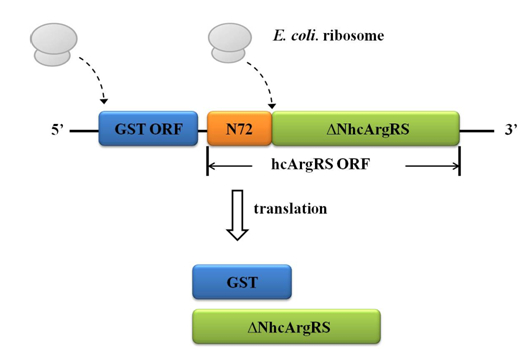
Scientists Reveal mRNA of Human Cytoplasmic Arginyl-trna Synthetase Recruits Prokaryotic Ribosome Independently
Jun 27, 2014 Email"> PrintText Size

There are two isoforms of cytoplasmic arginyl-tRNA synthetase (hcArgRS) in human cells. The long form is a component of the multiple aminoacyl-tRNA synthetase complex (MSC) and another is a N-terminal truncated form (DNhcArgRS), free in the human cytoplasm. It has been shown that the two forms of ArgRS arise from alternative translational initiation in a single mRNA encoding hcArgRS. The short form is produced from the initiation at a downstream in-frame AUG start codon.
Dr. YANG Fang and colleagues led by Prof. WANG Enduo, at the Institute of Biochemistry and Cell Biology, Shanghai Institutes for Biological Sciences, found that the alternative translational initiation of hcArgRS mRNA also takes place in E. coli transformants. Two isoforms of ArgRS were found when hcArgRS was over-expressed in E. coli. Those two isoforms are identical to the forms of hcArgRS in human cytoplasm. The short protein is also produced from the alternative translational initiation in the same mRNA.
Further analysis revealed that the mRNA encoding N-terminal extension of hcArgRS can recruit E. coli ribosome independently. Two critical elements for recruiting the prokaryotic ribosome were identified, the “AGGA” core of Shine-Dalgarno sequence and the “A-rich” sequence located just proximal to the alternative in-frame initiation site.
This study may provide the mechanism of alternative translational initiation of hcArgRS mRNA in human cells.
This study entitled “The mRNA of human cytoplasmic arginyl-tRNA synthetase recruits prokaryotic ribosome independently” was published online in Journal of Biological Chemistry on June 4, 2014. The work was supported by grants from the National Natural Science Foundation of China and the Natural Key Basic Research Foundation of China.

The mRNA encoding N-terminal 72-peptide (N72) of hcArgRS recruits E. coli ribosomes. (Image by Prof. WANG Enduo’s group)
There are two isoforms of cytoplasmic arginyl-tRNA synthetase (hcArgRS) in human cells. The long form is a component of the multiple aminoacyl-tRNA synthetase complex (MSC) and another is a N-terminal truncated form (DNhcArgRS), free in the human cytoplasm. It has been shown that the two forms of ArgRS arise from alternative translational initiation in a single mRNA encoding hcArgRS. The short form is produced from the initiation at a downstream in-frame AUG start codon.
Dr. YANG Fang and colleagues led by Prof. WANG Enduo, at the Institute of Biochemistry and Cell Biology, Shanghai Institutes for Biological Sciences, found that the alternative translational initiation of hcArgRS mRNA also takes place in E. coli transformants. Two isoforms of ArgRS were found when hcArgRS was over-expressed in E. coli. Those two isoforms are identical to the forms of hcArgRS in human cytoplasm. The short protein is also produced from the alternative translational initiation in the same mRNA.
Further analysis revealed that the mRNA encoding N-terminal extension of hcArgRS can recruit E. coli ribosome independently. Two critical elements for recruiting the prokaryotic ribosome were identified, the “AGGA” core of Shine-Dalgarno sequence and the “A-rich” sequence located just proximal to the alternative in-frame initiation site.
This study may provide the mechanism of alternative translational initiation of hcArgRS mRNA in human cells.
This study entitled “The mRNA of human cytoplasmic arginyl-tRNA synthetase recruits prokaryotic ribosome independently” was published online in Journal of Biological Chemistry on June 4, 2014. The work was supported by grants from the National Natural Science Foundation of China and the Natural Key Basic Research Foundation of China.

The mRNA encoding N-terminal 72-peptide (N72) of hcArgRS recruits E. coli ribosomes. (Image by Prof. WANG Enduo’s group)
CAS Institutes
There are 124 Institutions directly under the CAS by the end of 2012, with 104 research institutes, five universities & supporting organizations, 12 management organizations that consist of the headquarters and branches, and three other units. Moreover, there are 25 legal entities affiliated and 22 CAS invested holding enterprisesThere are 124 I...>> more
Contact Us

Chinese Academy of Sciences
Add: 52 Sanlihe Rd., Xicheng District, Beijing, China
Postcode: 100864
Tel: 86-10-68597592 (day) 86-10-68597289 (night)
Fax: 86-10-68511095 (day) 86-10-68512458 (night)
E-mail: cas_en@cas.cn

